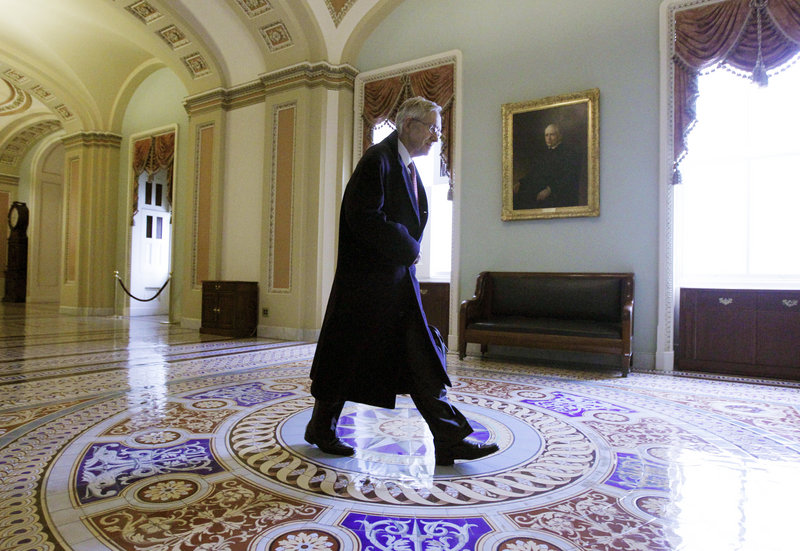WASHINGTON- Here’s the funny thing about this month’s “lame duck” session of Congress, in which frantic legislators have pinballed from tax cuts to “don’t ask, don’t tell” to a nuclear weapons treaty.
It’s not supposed to exist.
In 1933, historians say, the country ratified a constitutional amendment intended to kill off sessions like this — where defeated legislators return to legislate. The headline in The Washington Post was “Present Lame-Duck Session Will Be Last.”
But, thanks to a hole in that amendment, modern Congresses have not only met as lame ducks — they have used the post-election session to take some of their most memorable votes.
This month, Congress has already approved a giant tax-cut bill and new legislation on child nutrition. In the remaining days, Democratic leaders hope to rewrite immigration rules, allow gays to serve openly in the military and ratify a nuclear weapons treaty with Russia.
This year’s session has “the most ambitious legislative agenda that’s ever been pursued in a lame-duck session since the 20th Amendment,” said John Copeland Nagle, a law professor at the University of Notre Dame and one of the obscure amendment’s few scholars.
This session, Nagle said, “is exactly what the 20th Amendment was designed to stop.”
This lame-duck session has brought an odd atmosphere to Capitol Hill: There are few long-winded committee hearings, few VFW delegations to glad-hand. Instead, legislators are tackling one enormous issue after another, with very un-congressional efficiency.
On Thursday night alone, the House voted to approve an $858 billion plan to extend Bush-era tax cuts and use other tax breaks to stimulate the economy. Among those voting: dozens of lawmakers who lost elections last month.
Across the Capitol, through empty hallways, Senate Democrats were bitterly disappointed that they couldn’t pass a $1.2 trillion, 1,924-page spending bill.
But then Senate Majority Leader Harry Reid just moved on to the remaining pieces of the Democrats’ lame-duck agenda. He announced he would seek votes today on the repeal of the “don’t ask, don’t tell” policy — prohibiting gays from serving openly in the military — and a bill overhauling parts of immigration law.
“We have got to move this along,” Reid said.
All of this would be a surprise, historians say, to legislators from the 1930s. They thought they had finally stopped a congressional practice that had caused controversy since John Adams was president.
The trouble with lame ducks began in 1801, when the outgoing Federalists used their last days in power to help appoint a bunch of judges. It simmered through the 1800s, then flared again in 1922, when President Warren Harding and the lame-duck Republicans tried to ram through unpopular legislation after their defeats.
Opponents said this was un-democratic: These sessions seemed to violate the ever-popular Washington rule that “elections have consequences.” Finally, Congress passed — and the states ratified — the 20th Amendment.
Historians say lawmakers thought they were ending lame-duck Congresses forever.
But there was a problem. Their amendment didn’t actually say it was ending lame-duck Congresses forever. Its text only moved Congress’s end date from March back to early January. It also shifted the president’s inauguration from March back to Jan. 20.
At that time, historians say, it was inconceivable that legislators would journey back to Washington to meet for a few weeks after Thanksgiving.
“The big mistake of the crafters of the 20th Amendment was that they didn’t really anticipate airplane travel,” said Bruce Ackerman, a Yale University law professor. “It takes a lot of time to go from a district in Texas by train to Washington, D.C. Who’s going to schlep there?”
Still, for the next 47 years, the amendment seemed mostly to work as intended. There were some lame-duck sessions, often in wartime, but no grand legislative agendas.
Then, historians say, things started to change.
In 1980, Democrats came back after losing the presidency and the U.S. Senate, and passed major bills including one that created the Superfund toxic-cleanup program.
Then, in 1998, Republicans came back after losing seats in the House, and voted to impeach President Bill Clinton.
This time around, it’s Democrats defending their lame-duck session. Aides to top Democrats in Congress said their ambitious agenda was necessary: Tax cuts and government-spending bills had imminent deadlines, and other agenda items had been blocked by Republicans earlier in the year.
“We wouldn’t need to be doing all this in the lame duck if the Republicans had not obstructed and delayed everything that we had been trying to do,” said Regan Lachapelle, a spokeswoman for Reid. “I don’t see anything wrong with working for the American people to get things done.”
Send questions/comments to the editors.



Success. Please wait for the page to reload. If the page does not reload within 5 seconds, please refresh the page.
Enter your email and password to access comments.
Hi, to comment on stories you must . This profile is in addition to your subscription and website login.
Already have a commenting profile? .
Invalid username/password.
Please check your email to confirm and complete your registration.
Only subscribers are eligible to post comments. Please subscribe or login first for digital access. Here’s why.
Use the form below to reset your password. When you've submitted your account email, we will send an email with a reset code.